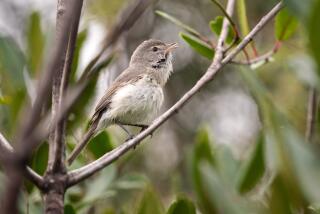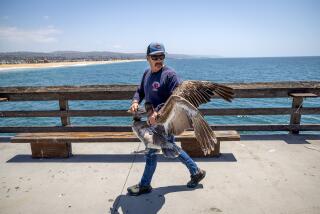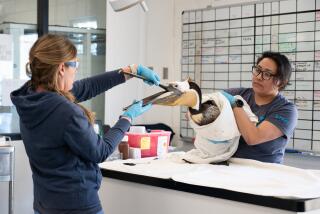Bird Rescue Station Shuts Down : Cleanup: Nearly all of the oil spill’s feathered victims have either died or already been captured and treated, volunteers say.
- Share via
HUNTINGTON BEACH — When a shapeless creature wrapped tightly in a flowered bedsheet was lifted out of a pickup truck Thursday morning, rescue workers were waiting.
Within minutes of its arrival at the Huntington State Beach lifeguard station, the protective wrappings were cut away and a California brown pelican emerged, bedraggled and terrified, its dark feathers matted with oil.
As the pelican strained to move its heavy wings, bird expert Marge Gibson held it immobile but spoke to it softly, soothingly.
“Had a bad morning, hey guy,” she said as she settled the pelican’s black webbed feet atop a white-covered worktable and matter of factly set about caring for it.
For the oiled pelican, discovered about an hour earlier near the Newport Beach Pier, there were more indignities to come. Gibson, director of the station, took its temperature rectally with a baby thermometer, then gently forced a long red tube filled with nutrients into its beak.
That done, she and volunteer Betty Pridy lifted the pelican into a towel-lined cardboard box and placed it beside a portable heater. It was only “moderately oiled” Gibson said; it should survive.
Over the last two weeks--ever since a Feb. 7 tanker spill off Huntington Beach created an environmental disaster for Orange County’s shore life--a back room at the main state lifeguard station here has served as a field hospital for oil-covered birds--among them Western grebes, surf scoters, Pacific loons and pelicans, an endangered species. Its mission has been to stabilize the birds, then send them on to a major bird rehabilitation center at Terminal Island, there to be washed of the oil and prepared for release.
The station’s medical supplies were simple--latex gloves and cotton jumpsuits for the workers, lots of Pedialyte, Murine and cotton swabs (for cleaning avian eyes irritated by crude oil), and donated towels, bedsheets and cardboard boxes to keep the feathered patients warm.
But this bird recovery station--which at its peak had the frenetic pace of an army MASH unit--was closing Thursday. By now, nearly all the birds oiled in the spill are thought to be either captured or dead, state wildlife biologists said.
On Feb. 12, the station’s busiest day, the Huntington Beach facility handled 151 birds, and Gibson and her 15-year-old daughter worked at least 16 hours straight. In the first week of the spill they were joined by at least 15 volunteers including Pat Shea, a garden club officer from Fountain Valley who took it upon herself to make chili and sandwiches for up to 40 workers a day.
By contrast Thursday, activity was clearly winding down. Gibson cared for just five birds--one limp and very ill Pacific loon, suspected of having ingested oil, and four oil-coated pelicans.
For Gibson, much of the recovery effort was a success story. Of 452 birds brought alive to the lifeguard station and medically “stabilized” there, only three died there.
Still, not far from her worktable were two large commercial food freezers marked with bright yellow labels that said “EVIDENCE.”
Inside, stashed in plastic bags and frozen hard as a rock, were the bodies of more than 100 birds--pelicans, surf scoters, grebes, cormorants that died of hypothermia when oil robbed their feathers of their insulating power, or that ingested the poisonous stuff. Their bodies are to undergo necropsies and kept indefinitely by the U.S. Fish and Wildlife Service as evidence against the firms involved in the spill.
Gibson, director of the Birds of Prey Center in Villa Park, has seen the evidence of oil spills before. She helped rescue bald eagles oiled last year in the much larger spill that occurred when the tanker Exxon Valdez went aground off Valdez, Alaska. For that spill she was temporarily employed by International Bird Rescue, a Berkeley firm hired to clean the birds.
She acknowledged that working on badly oiled birds can be terribly upsetting. “I think any time you see any animal that’s obviously distressed, and there’s a question as to how he’s going to survive, you do your best,” she said. “But sometimes you feel terrible. Because it is a man-involved accident. They did not do anything. They were just swimming.”
For all that, Gibson said she was not angry at British Petroleum, whose oil it was that spilled. Rather, she is concerned that “people are going to forget this once the beaches are clean.”
After all, she said, “British Petroleum didn’t mean for (the oil spill) to occur. But we’re all responsible because we all use oil.”
More to Read
Sign up for Essential California
The most important California stories and recommendations in your inbox every morning.
You may occasionally receive promotional content from the Los Angeles Times.










